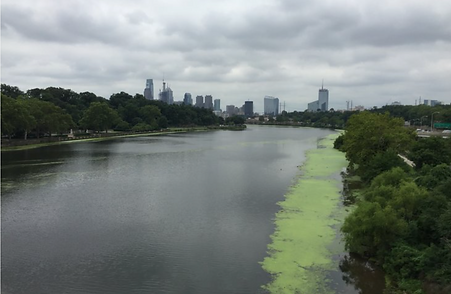Philadelphia, USA
Climate Change Impacts
Urban Heat Island Effect (UHI): Climate change makes cities even hotter. Rising global temperatures make the urban heat island effect more extreme, trapping heat in roads and buildings.
PFAS ("Forever Toxic Chemicals"): Climate change worsens PFAS water contamination. Rising temperatures cause droughts and wildfires, which concentrate PFAS in lakes and rivers, making drinking water even more toxic.
VOCs (Volatile Organic Compounds): React with sunlight to form ground-level ozone (smog), making air pollution worse.
Indoor air pollution gets worse. Heatwaves keep people inside, increasing exposure to VOCs from cleaning products, aerosol sprays, and paints, leading to lung damage and respiratory diseases.
Case Study: The Impact of PFAs
Why are PFAs a significant issue?
-
Contamination of drinking water -
-
once PFAS enter the water supply, they cannot be filtered out easily.
-
-
Accumulation in the human body -
-
exposure to PFAS has been linked to cancer, hormone imbalances, and weakened immune systems.
-
Environmental Problem:
-
PFAs in water sources
-
Leads to lakes, rivers, and underground water supplies become contaminated, making it difficult and expensive to provide safe drinking water.
-

-
Climate Change increases the spread of PFAs
- Leads to rising floods, storms, and hurricanes wash PFAS into new areas, exposing more communities to toxic chemicals.
-
PFAs in Food & Agriculture
-
Leads to PFAS-contaminated soil and water pollute crops and livestock. People consume PFAS through food.
-
How do PFAs impact me?
-
Wildfires release PFAS into the air – Firefighting foams used to contain wildfires contain PFAS, which can spread through smoke, ash, and rainfall.
-
Increased risk of diseases – PFAS exposure is linked to cancer, hormone disruption, and weakened immune systems.
-
PFAS never break down – Unlike other pollutants, PFAS do not decompose, meaning once they enter your body or environment, they stay there for years.
Solutions!!
What Can I Do?
-
Use bicycles and public transportation instead of driving to reduce carbon emission and VOCs.
-
Advocate for local and national policies that ban PFAS and increase funding for clean drinking water initiatives.
-
Join Local Organisations
-
The Philadelphia Bicycle Club
-
Lower Merion Township
-


